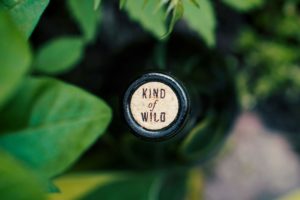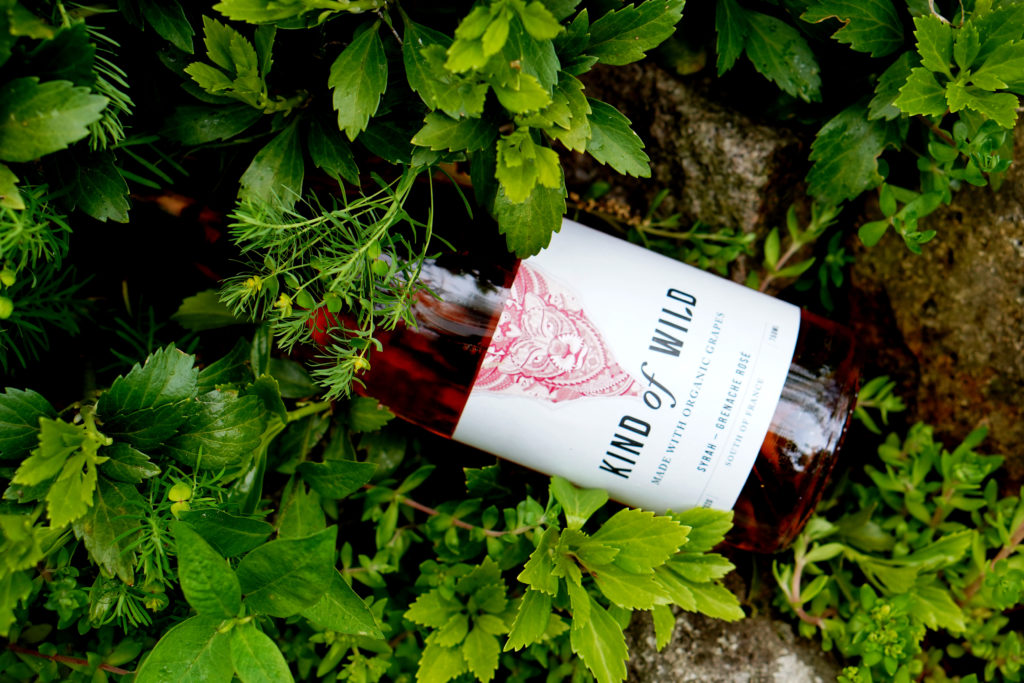Wine and Wellness
Why You Should Be Drinking Certified Organic Wine

With the rise of sustainability and ethical farming becoming a global responsibility, many of us have made the switch to an organic pantry. The facts are there to encourage this lifestyle move: studies show that organic foods grown with fewer pesticides have more beneficial nutrients than their conventionally-grown counterparts. In conjunction with the growth of the organic food movement, in recent years, a variety of certified organic wines have also started appearing on grocery shelves. Yet, have you considered making the switch with your wine?
If you haven’t (and that’s okay!), read on to learn about how this winemaking practice and the range of benefits it carries is enjoying an uptake in popularity and for good reason too: it’s better for both our planet and our overall health.
Like most of us, Kind of Wild founders Adam and Jordan Sager were initially unaccustomed to the value of drinking wine made from organically grown grapes. So they embarked on their own journey of wine wellness which led them to found Kind of Wild in 2020.
Read on to learn why the next glass of wine you pour should be organically produced.
Better For the Planet, Best For You
Certified organic wine is exactly what its name suggests. Put simply, the grapes must be grown in vineyards which restrict the use of synthetic chemicals and non-organic fertilizers. Not only does this mean a decrease in potentially harmful chemicals entering the soil, but it also ensures that the quality of the fruit remains uncompromised.
Vineyards that farm organically make a habit of utilizing sustainable farming practices. Planting organic cover crops between vine rows, natural composting, and relying on the naturally occurring habitat to protect the vines as opposed to non-organic materials that leave an increased carbon footprint are all features unique to these vineyards.
It’s also valuable to note that organic wine is not a new practice by any means. In fact, since the advent of agricultural chemicals in the nineteenth century, many people have warned of risks to public health and the environment. Unfortunately, lobbyists struggled to attract an audience until the late 1960s, when organic farming and natural food stores first started to gain traction. It didn’t take too long for the organic wine industry to join the bandwagon as winemakers were motivated by the prospect of creating a product that was environmentally friendly and improved the quality of the soil.
Transparent Production Methods
Kind of Wild was born to make high-quality, certified organic wine readily available to those seeking a more environmentally friendly wine. We take quality control one step further by ensuring that all of our producers are certified by a third party.

“This is a very important step”, emphasizes Adam. “Undergoing a thorough certification process guarantees that the wines are made with organic grapes. This doesn’t stop in the vineyards. The cultivation practice is followed by sound organic winemaking steps.”
Organic vineyards clearly have a profound positive impact on the environment. The same rings true for its health benefits. The movement towards organic produce is premised on enhancing the health and wellness of those who consume it, so why should wine be any different?
“Chemical residues on grapes could have a lasting effect on one’s health”, Adam reminds us. The benefit of certified organic wine lies in the transparency of its production. There are no weird, impossible-to-pronounce artificial agents to be found in our Kind of Wild wines. You always know exactly what you’re getting. This empowers our customers to make informed decisions for both their health and pleasure. “I am confident that certified organic wine is the healthier choice”, he states.
This myriad of benefits is enough to convince even the firmest skeptic. Perhaps most enticing of all are the studies (such as this recent UCLA one) that suggest wine made from organic grapes actually tastes superior to non-organic wines – a phenomenon that encourages Adam and Jordan’s business model:
“Certified organic wines have palpable energy and tension about them that is not present in non-organic varietals”, Adam explains. “From a purely scientific level, if you were to observe crystallized organic certified wine samples under a microscope you would see the most vibrantly hued pattern of colors in the cells. Of course, it makes sense that this would result in a far more pleasant tasting experience”.
A Powerful Shift
For co-founder Adam, his passion for organic vineyard practices was truly sparked by the arrival of his first child. This joyous event marked an intentional shift in the lifestyle choices he and his wife began to make. When they committed to feeding their daughter only organic food, they opted to make the same commitment to their diets. The results spoke for themselves:
“It did wonders for my mental health! I feel better about myself and the world around me. My energy levels have increased extensively, I get sick far less often, and I work out more consistently despite having less free time on my hands. The benefits of eating organic have been enormous,” Adam enthuses.
This positive outcome was so impactful that it altered Adam’s perspective on wine as well, and he began to question why the organic food movement did not extend as readily to the beverages we consume. Although humans have naturally been eating organically for centuries, wine made from organic grapes has only recently entered the mainstream market. Right now, organic vineyards account for a mere five percent of the wine produced globally, compared to the US produce market for example that is 15% certified organic.
Jordan explains:
“The demand for wine made from organic grapes is lower in comparison to organic produce. However, Kind of Wild wines sees this as an exciting opportunity to illustrate why people should prioritize consuming organic beverages, as well as to encourage more vineyards to convert to organic practices by generating increased demand.”
The Rigours of Excellence
With this goal in mind, Jordan and Adam have been steadfast in their endeavor to make certified organic wine accessible to as many US wine enthusiasts as possible. Together, they achieved this by honing close relationships with highly skilled organic winemakers from the world’s top wine regions.
“We have developed relationships with growers in many countries and decided to launch Kind of Wild with four wines from Europe and two from South America. This allowed us to provide our customers with a uniquely diverse experience”, Jordan says proudly.

The authentication process for wine to become organically certified is rigorous, and the team at Kind of Wild are not ones to forego their due diligence. Growers first need to have their vineyards certified locally after passing the required conversion period in their country. The typical waiting period to be certified is three years after undertaking organic production. In addition, their winery and its production facilities must also be certified. After local certification is successful, US certification is then applied for from the CCOF. This US-based body liaises with foreign agencies with regards to best practices and standard operating procedures in order for the wine to be considered organic.
By adhering to these stringent standards, the environmental and health benefits for which certified organic wine is lauded are upheld and protected. With so many upsides and really, no discernible drawbacks, it’s safe to say that certified organic wine should be enjoyed by wine lovers worldwide. The good news? It’s already beginning to happen, with Kind of Wild wines being the first winery in the US to bring certified organic wine delivered straight to your door.
A Wild Solution!
Finding great organic wines is never easy. Some stores hide them in the back, but it’s always the same old brands. If you are looking to drink more organic wines, then Kind of Wild Wines is the perfect solution for you! Order any amount or sign up for Club Wild to subscribe and save on every order.
